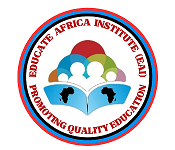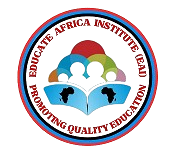PUBLIC EDUCATION ON THE ROLE OF SOCIAL WORK IN NATION-BUILDING
By WILLIAM BOADI
Executive Director, Educate Africa Institute (EAI), Educationist & Political Analyst and Social Worker.

Theme: The Role of Social Work in Nation-building and Sustainable Development
Introduction
Good [morning/afternoon/evening], distinguished guests, esteemed colleagues, students, and members of the community. It is a great honor to stand before you as the Executive Director of Educate Africa Institute (EAI), an educationist, and a political analyst, to discuss a subject that is dear to my heart Social Work and Its Impact on Nation-Building and Sustainable Development.
In a rapidly evolving world characterized by economic shifts, political uncertainties, and social inequalities, social work remains a fundamental pillar of stability, justice, and human progress. It is more than a profession; it is a commitment to humanity, a call to serve, and a driving force for positive change.
Understanding Social Work
Social work is a professional practice dedicated to empowering individuals, groups, and communities to enhance their well-being. It is rooted in the values of social justice, human rights, and advocacy. Social workers engage in diverse areas, including child welfare, healthcare, education, mental health, social policy, and community development.
In Ghana, the role of social workers is increasingly crucial as we grapple with challenges such as poverty, unemployment, inadequate healthcare, gender inequality, and the marginalization of vulnerable populations. Without an effective social work system, these issues threaten national stability and development.
The Role of Social Work in Nation-Building
1. Advocating for Social Justice and Human Rights
Social workers are at the forefront of championing the rights of the marginalized, advocating for policies that promote equal opportunities, and addressing systemic inequalities in society.
2. Strengthening Communities and Social Cohesion
By working closely with communities, social workers help resolve conflicts, promote peace, and foster unity. This is essential in diverse societies like Ghana, where ethnic and political divisions often undermine progress.
3. Enhancing Access to Quality Education
Education is a key driver of national development. Social workers collaborate with educators, parents, and policymakers to ensure that children especially those from disadvantaged backgrounds have access to quality education. At EAI, we believe that education is a powerful tool for breaking the cycle of poverty and shaping future leaders.
4. Providing Mental Health and Psychosocial Support
The pressures of modern society have led to an increase in mental health challenges. Social workers provide essential counseling and psychosocial support to individuals struggling with depression, anxiety, and trauma, thereby contributing to a healthier and more productive workforce.
5. Influencing Policy and Governance
As a political analyst, I recognize the significance of policy formulation in addressing social issues. Social workers play a crucial role in advising governments, drafting policies, and implementing programs that tackle social problems effectively. Their insights ensure that governance is people-centered and inclusive.
Challenges and the Way Forward
Despite its importance, social work in Ghana faces numerous challenges, including underfunding, lack of recognition, limited training opportunities, and inadequate policy implementation. To strengthen the profession, we must:
▪️Advocate for stronger government support and funding for social work programs.
▪️Invest in professional training and development.
▪️Foster collaborations between social workers, policymakers, and non-governmental organizations.
▪️Educate the public on the value of social work in national development.
Conclusion
Social work is not just about charity; it is about empowerment, advocacy, and systemic change. If we truly desire a Ghana that is inclusive, just, and progressive, we must elevate the role of social work in our national discourse and development agenda.
As we leave here today, I urge everyone government officials, educators, students, and civil society leaders—to support the cause of social work. Together, we can build a Ghana that thrives on equity, social justice, and sustainable progress.
Thank you.
Long live EAI
Long live Ghana.



